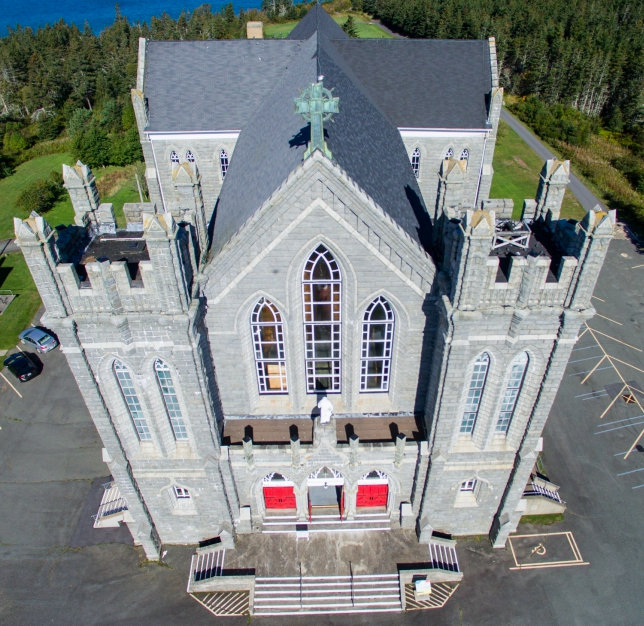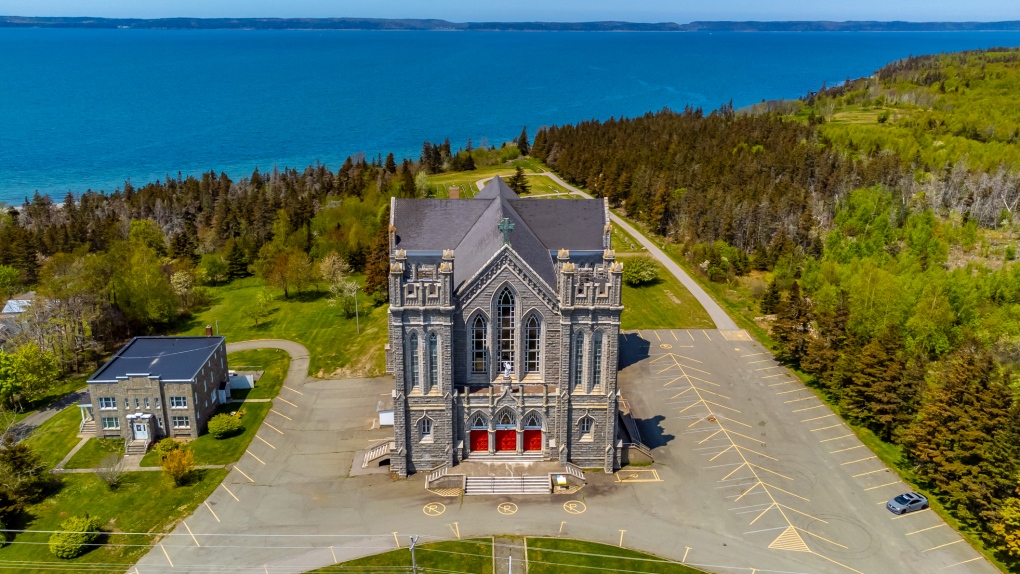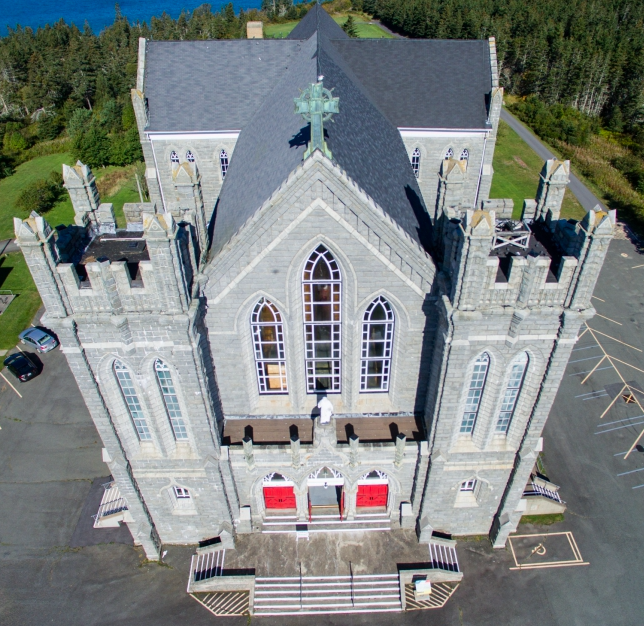Tokens, Traditions, and Transformation: The Fight to Preserve St. Bernard's Sacred Stone Sanctuary
St. Bernard church,crucible where archaic fundraising methodologies collide with cutting-edge crowd fundrd financial Token instrumentalization.


Reimagining Cultural Preservation: Tokenization, Technology, and the Renaissance of Acadian Heritage
In the enigmatic landscape of Nova Scotia's rural Acadian communities, a profound narrative of cultural preservation and technological innovation is unfolding—a tale where traditional patrimony confronts the transformative potential of blockchain and digital strategy. The St. Bernard church, a majestic 14,000-square-foot granite edifice, stands as a metaphorical crucible where archaic fundraising methodologies collide with cutting-edge crowdfunding financial Token instrumentalization.
The Antiquated Fundraising Paradigm: Penny Sales and Culinary Raisin Pie Bake Sales
Traditional Acadian cultural preservation has long been tethered to quaint, localized fundraising mechanisms—penny sales, rappie pie bake sales, and community-driven monetary aggregation strategies that reflect a charming yet fundamentally limited economic imagination in preserving the Eglise de St Bernard.
While steeped in communal solidarity, these methodologies represent an increasingly obsolescent approach to substantial capital angel investor start-up generation in an era of digital financial revolution, like we see in these times of great change. Local Bell Media Inc. owned and operated CTV Atlantic.ca, which sings hard times in the Maritimes nightly, while savvy entrepreneurs in Canada raise billions of dollars to do stuff.

The persistent reliance on gastronomic events and micro-transactional fundraising epitomizes a profound resistance to technological disruption. Where innovative marketers like Theriault envision sophisticated tokenization strategies—proposing 100 token shares at $2,500,000 each... yes, each. It`s big time corporate sponsorship, 100 bite-sized bits at a time—yet traditional stakeholders remain emblematic of institutional inertia, their ears metaphorically sealed against transformative possibilities because they are that conservative and backward thinking.
Blockchain and Tokenization: A Visionary Pathway to Cultural Go Fund Monetization
The proposed tokenization model represents more than a mere financial instrument; it radically reimagines cultural asset preservation. By fractionalizing ownership of the St. Bernard church through blockchain technology, these organizations could create a global investment ecosystem that transcends geographical and cultural boundaries like never before.
"Digital Renaissance: How Blockchain Tokenization Could Save Nova Scotia's Forgotten Acadian Cathedral"
The provocative parallel of the Newfoundland Fogo Island Inn in Joe Batt`s Arm—a destination that has transformed an ostensibly peripheral location into a globally recognized luxury experience where the Hotel itself is the destination since its unique selling proposition is the local Newfoundland Food people and music which people with serious money want crave need and will pay big money to be part of; to unwind on levels all the chic La Di Da Spa hotels of the world cannot offer—making the Fogo Island Inn amongst the most expensive destination hotels in the world as a whole.
Last year, thanks to your votes, Fogo Island Inn was ranked the #1 hotel in Canada and #3 worldwide in the Travel + Leisure World's Best Awards.
This archetype demonstrates how strategic positioning and innovative narrative construction can transmute seemingly marginal cultural spaces into compelling investment asset propositions.
"Fogo Island Inn is a 100% social business: it was built using philanthropic funds and all surpluses are returned to Shorefast for reinvestment in the Community of Fogo Island. No investors seek a return, and there is no private gain." Each member of the community is a beneficial owner of the Inn. That is innovation that the fractured Acadian community could learn from to move forward with a change.
Legal Complexities and Institutional Resistance to innovation, like Theriault
The recent lawsuit filed by the Archdiocese of Halifax-Yarmouth against the Société Héritage Saint-Bernard and Nation Prospère illuminates the intricate legal and financial challenges confronting cultural preservation efforts, sending it into the classic feedback loop of more feasibility studies and reports. With only approximately $40,000 raised against a $250,000 purchase price, the organizations have prioritized urgent infrastructural repairs over comprehensive preservation strategies that would move the project forward.

New method for Patrimonial Heritage conservation funding
The architectural significance cannot be overstated: this granite structure, which consumed 32 years of construction (1910-1942), represents one of Atlantic Canada's most substantial historical monuments. Its potential transformation from ecclesiastical space to cultural destination epitomizes the ongoing negotiation between preservation and adaptive reuse. The committees should read and duplicate the Shorefest.org template and apply it here or die from lack of effort.
"The 100 X $2.500,000 Gamble: Tokenizing Culture, Saving History at St. Bernard's Church"
We inhabit an unprecedented epoch of financial plasticity, where capital gravitates towards narratives that blend cultural authenticity with technological innovation. The success of preservation efforts will increasingly depend not on traditional fundraising but on crafting compelling value propositions that resonate with global investors, cultural philanthropists, and digital-native stakeholders.
The tokenization approach suggested by forward-thinking marketers like Theriault represents more than a fundraising mechanism—it is a philosophical statement about cultural value, democratized ownership, and the potential to transform heritage sites into dynamic, economically sustainable entities.
"Granite, Blockchain, and Dreams: Rescuing an Architectural St-Bernard Curch Marvel in Rural Acadian Nova Scotia"
We are witnessing a pivotal moment where technological sophistication could intersect with cultural preservation and set a global precedent for artistic innovation. Deep Poclet Philantropic Money is not merely available; it gravitates towards unique, transformative propositions that offer more than passive ownership—they promise active participation through token asset shares in a living, evolving narrative of cultural renaissance on a world stage.
The St. Bernard church stands not just as an architectural artifact, but as a potential Archetypal symbol of Acadian strength and resilience through innovation—a testament to the power of reimagining heritage through the prismatic lens of technological Tokenization innovation.

1. What is the main challenge facing rural Acadian Nova Scotia cultural preservation efforts?
Traditional fundraising methods like bake sales and penny drives are proving inadequate in the face of modern capital needs. These methods lack scalability and cannot compete with today’s digital financial tools.
2. How could tokenization help preserve the St. Bernard church?
Tokenization would allow fractional ownership of the church using blockchain technology. Selling 100 digital token shares at $2.5 million each could attract global investors and create a self-financing restoration ecosystem.
3. What is the significance of comparing the St. Bernard church project to Fogo Island Inn?
Fogo Island Inn is a model of turning cultural and geographic marginality into a luxury, globally funded destination. This success story suggests that rural Acadian projects can also become attractive investment narratives with a proper digital strategy.
4. Why is there resistance to adopting tokenization among traditional stakeholders?
Institutional conservatism and legal complexities—highlighted by lawsuits and dependency on outdated models—create inertia. There is a hesitance to embrace new financial models like blockchain tokenization due to fear of disruption and lack of familiarity.
5. What broader vision does this project represent for Acadian heritage?
It represents a cultural renaissance that fuses heritage with innovation. The tokenization model is not just financial—it redefines how communities can engage with and preserve their past while building a dynamic, economically viable future.



